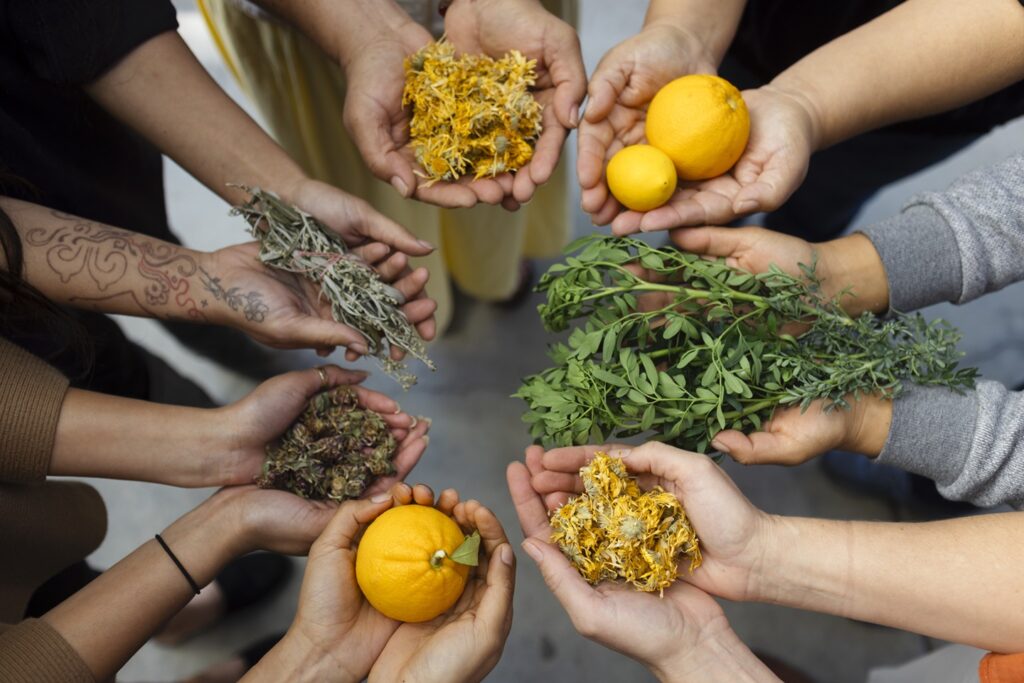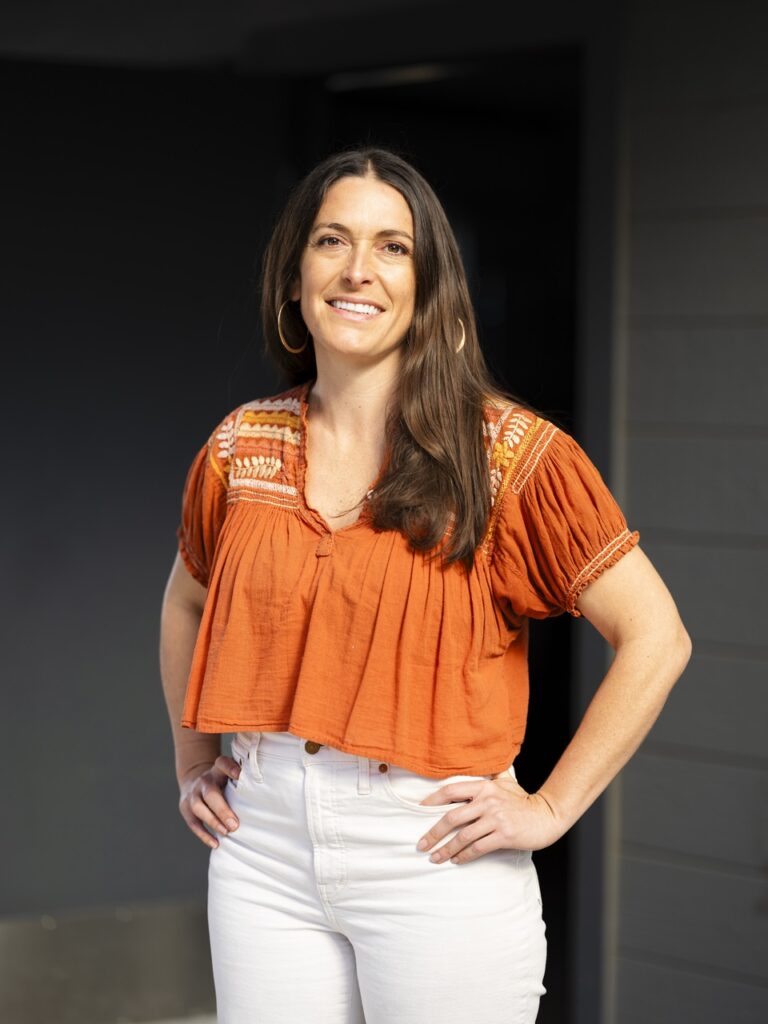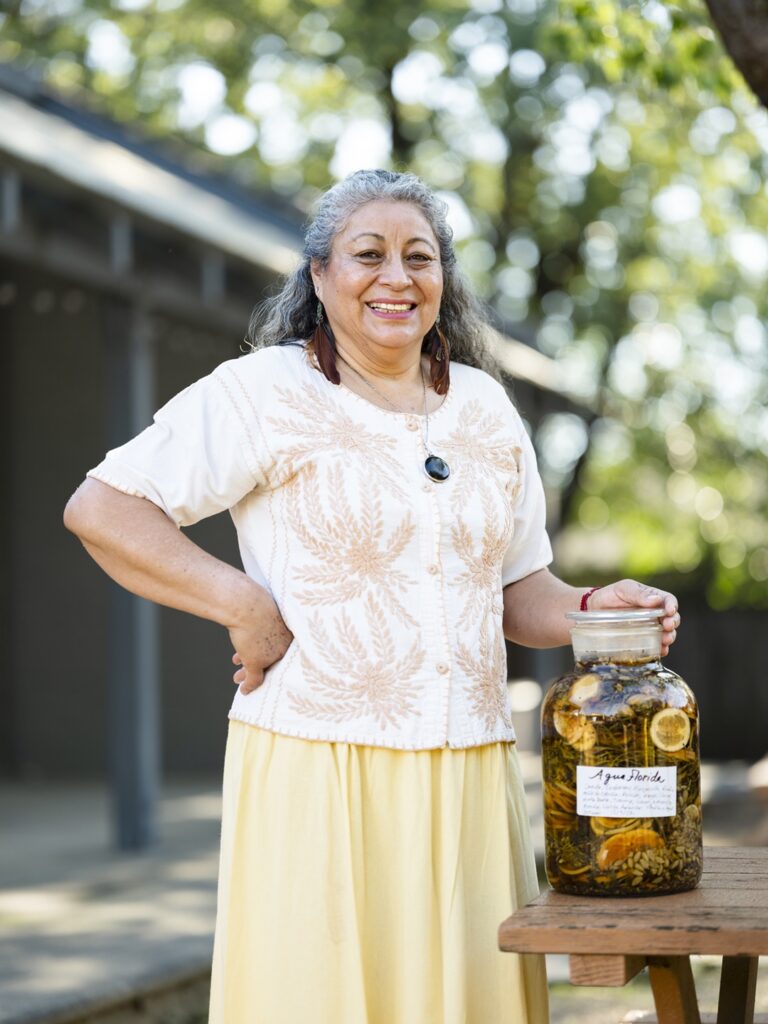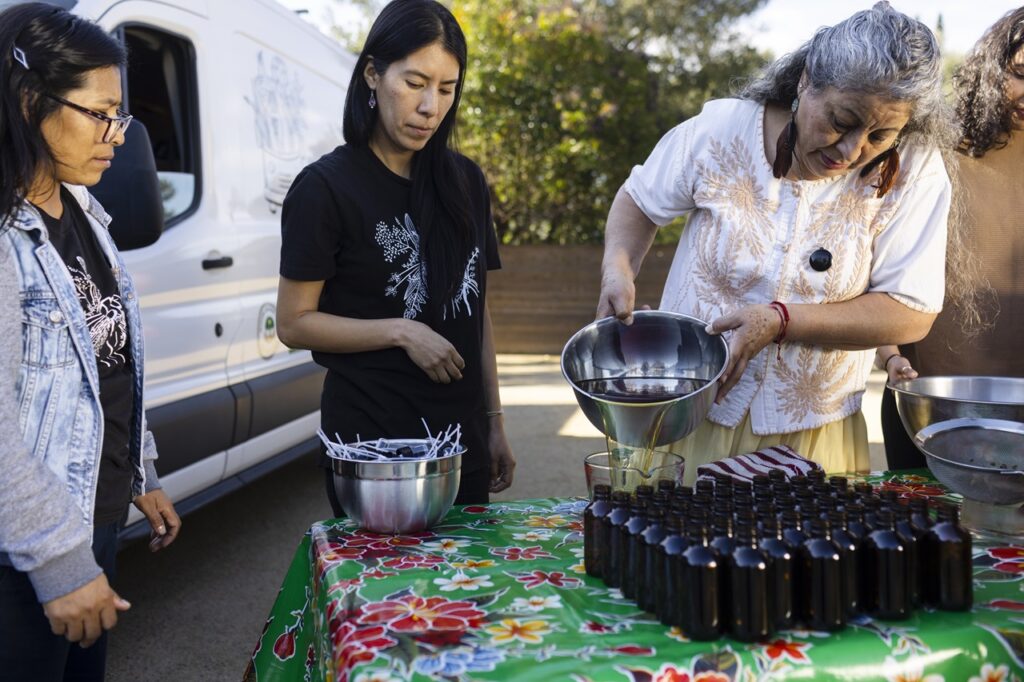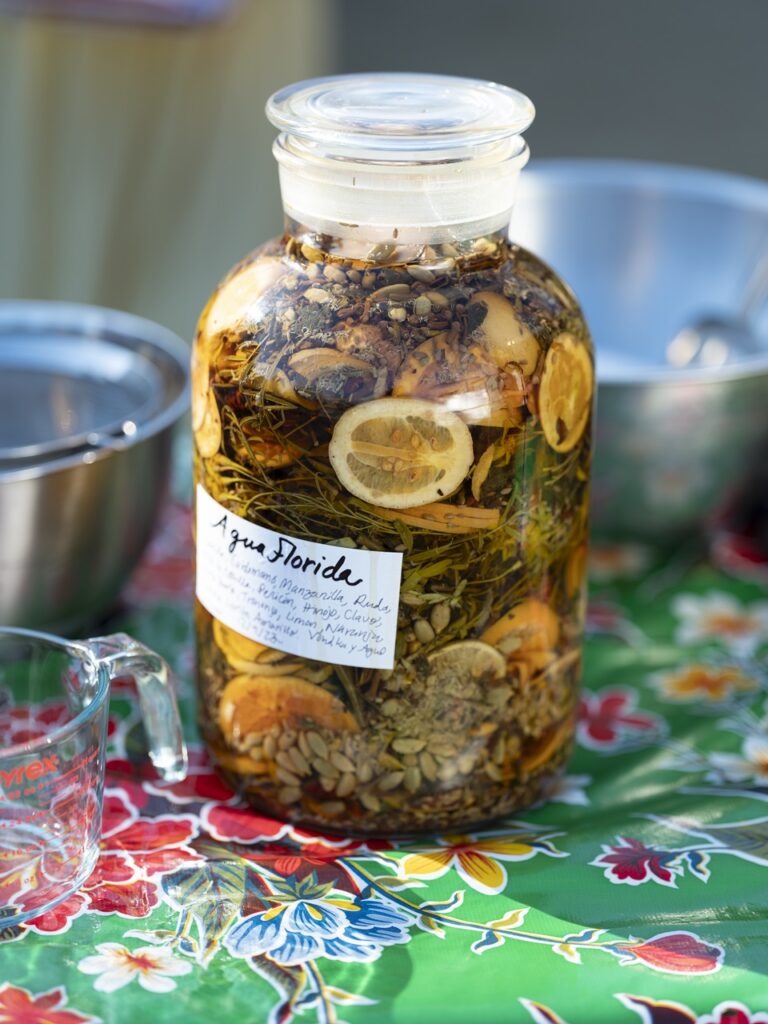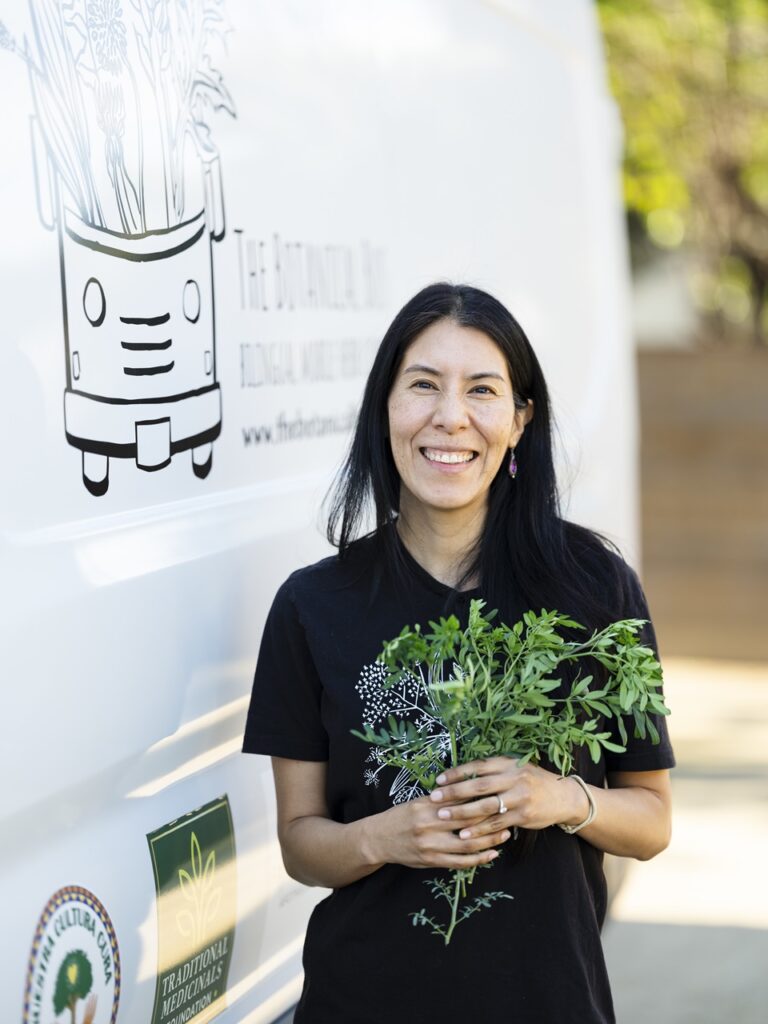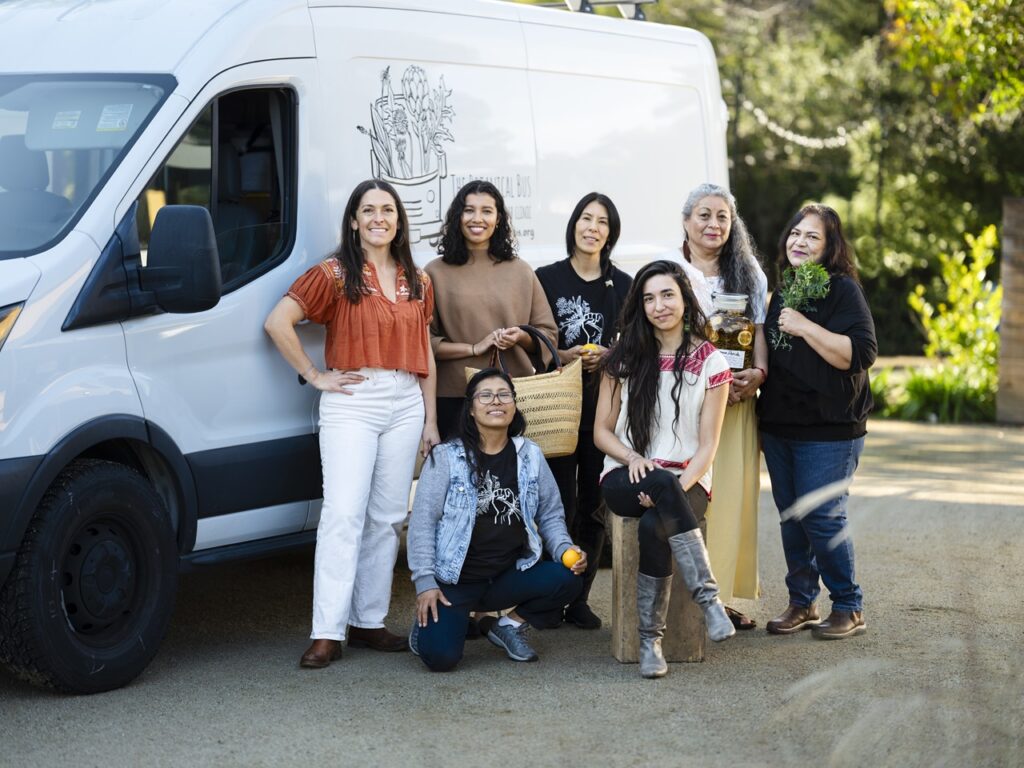Botanical Bus Bilingual Mobile Herb Clinic
Provides Traditional Plant Medicine On-the-Go
PHOTOS: PAIGE GREEN
When Concepción (her name changed for privacy) first connected with the Botanical Bus Mobile Herb Clinic in Santa Rosa, she was suffering from painful nerve damage to her hand and foot. She had immigrated here alone from the Peruvian Amazon rainforest just months earlier and had already seen Western doctors for her injury. Her mother, a healer still in Peru, emphasized that she should find plant medicine too.
“I had started receiving care for my injury, x-rays, and medication from the hospital,” Concepción tells Jocelyn Boreta, founder of the Botanical Bus Mobile Herb Clinic, “but I was in a lot of pain. I started asking around about a place to find natural medicine and someone in Roseland (Santa Rosa) told me about the Botanical Bus.”
The Botanical Bus bilingual herb clinic provides culturally centered, community-driven, holistic medicine and wellness programs by and for Latine and Indigenous people. Their Farmworker Clinics and Wellness Workshops are held around the county at schools, libraries, vineyard worksites, and family service centers like La Plaza: Nuestra Cultura Cura in Santa Rosa, where Concepción first encountered the Botanical Bus. Workshops are led by Promotora Clinical Health Workers (CHW) like Maria “LuLu” Centurión Pérez.
“In every connection, we show up to give and receive love as a human right,” says Pérez, who specializes in nervous tension, infant cranial therapy, and postpartum care. “I accompany our community in recognition of self-care as a lifestyle where the most important person is us.”
Holistic Health Workshops and Clinics
Boreta explains that there’s a strong continuous knowledge and tradition of plant medicine in the Latine and Indigenous communities today.
“In white European cultures, there’s been a return to herbal medicine,” she says, “but in the Latine indigenous community, it’s already there, it’s ongoing, the tradition is very much alive and well.”
Foundation grants and matching funds support one-on-one consultations and group workshops at community locations led by Promotoras out of the Botanical Bus—itself packed with hundreds of herbs and tinctures donated by the local herb company Galen’s Way. “We have a 60-herb tincture bar,” says Boreta, “and over 100 dried herbs that we will formulate into teas, baths, or essential oil inhalers.”
Another of their projects is the Farmworker Clinic Program. Farm and vineyard owners can contract with the Botanical Bus to hold a clinic onsite, sometimes literally in the vineyard. The bus pulls up, and the clinic’s 15-person team—half volunteers and half Promotora CHWs—circles up with a group of about 30 farmworker participants. The Promotora passes around some sage, opens the space, and recognizes the courage that it takes for people to show up to care for themselves.
“It’s a really powerful circle.” says Boreta. “The facilitator centers an herb, we’ll all try a little bit of the herbal medicine and set our intentions for the day. Next, everything comes out of the bus: chairs, tables, pop-up tents. We unpack into whatever space we have.”
Private consultation spaces and workshop spaces for small (eight-to-ten person) workshops are created near the bus, which becomes an apothecary for distributing herbs and tinctures recommended during the clinic.
“It’s not a relationship where the practitioners come to care for people or come to offer a service to someone who doesn’t have it,” explains Boreta. “We are equal in this care relationship. We are all medicine, and if you heal, I heal. And so that’s what (the CHW) says in every opening circle where we’re here to heal together.”
It’s a value held and adhered to by all the volunteers and Promotoras at Botanical Bus herb clinics and workshops.
“Our differences enrich us and our sharing nourishes us,” says Pérez. “In this connection, we also share with our brothers of green leaves, feathers, scales; those who crawl, those who walk on all fours or swim—we root ourselves to Mother Earth, honor our ancestors, and have the strength of our roots.”
During clinics and workshops, clients self-select a modality, consult about what is needed, and receive treatment and herbal remedies on the spot. The centering of indigenous foods is also a significant part of the mobile herb clinic’s programs. There’s a meal at every clinic, where everyone cooks together, exchanges recipes, and eats traditional foods.
More Than Holistic Health Care
While the organization provides various mobile services, including herbalism, massage, acupuncture, somatic therapy, diabetes prevention and care, and clinical nutrition, it offers more than holistic health care. It’s also a bridge to wider healthcare access on a path that regularly contains barriers for immigrant communities. And while Concepción did go to a hospital, many don’t.
“There’s a lot of real reasons why the Latine, Indigenous, immigrant community doesn’t access the healthcare system,” says Boreta, who explains that those reasons can include trust, transportation, hours of employment, language, and culture.
The Botanical Bus meets people where they are, literally and culturally. It means that familiar healing modalities are more easily available to the community. Also, importantly, it helps remove some of the existing obstacles to wider healthcare access. This builds a gateway to other parts of the healthcare system, creating trust, offering bilingual services, bringing practitioners and remedies directly to those who need them, and introducing client communities to additional services they may also need, including Western medicine at Community Health Centers.
Boreta founded the clinic nine years ago after her daughter was born and both her grandmothers had passed away. She joined a Farming for Health group of women at Bayer Farm in Santa Rosa that explored connection to the earth, herbal medicine, and nutrition.
“I felt this instinct to get out into the Spanish-speaking immigrant community and connect with abuelitas (grandmothers),” she shares. “It felt like pure magic. I felt like I was witnessing power in community and also connected to these roots in the earth and roots in the plants.” The Botanical Bus was born out of that group.
This year, the organization will begin an herbal apprenticeship program that aims to reduce the racialized dynamic that exists in health care. Licensure and certification models specific to clinical herbalism are often limited and expensive, which can prevent access. The new apprenticeship program at the Botanical Bus will provide a pathway for five BIPOC herbalists to begin that journey this year.
“Ninety eight percent of our clients are brown, and a majority of integrative health practitioners are white. While our programs are all led and founded by Latina indigenous people, many of our practitioners are white because of systemic inequity,” explains Boreta. “If we can provide pathways into becoming a BIPOC practitioner, it’s going to strengthen our programming and further our mission.”
A Unique Sense of Well-being
“We find that a unique sense of well-being is very much connected to plant medicine,” Boreta shares. She believes that the most unique thing that the Botanical Bus does is to celebrate botanical knowledge and the connection to Earth as a starting place for accessing well-being. She further adds that beginning with therapies that make a person feel whole—like the familiar scents of plants that are reminders of where one comes from—can help create that sense of well-being that is a great start to better health.
Concepción agrees. “After my first few visits taking recommended herbal medicine and receiving acupuncture at the Botanical Bus,” she tells Boreta, “I could feel my nerves reacting to the treatments. I thought to myself, yes…this is working.” Today, Boreta notes, Concepción’s limp is almost gone and she has joy in her eyes.
People can support the Botanical Bus by volunteering, donating, or sponsoring a workshop. There are specialized volunteer opportunities for licensed, certified health care practitioners, doctors, nurses, herbal practitioners, integrative health specialists, and massage therapists.
Find out more about the Botanical Bus, read Jocelyn Boreta’s entire interview with Concepción at thebotanicalbus.org
Kary Hess is the editor of Made Local Magazine and the author of the poetry collection “1912”. She lives and works in Sonoma County. karyhess.com
Glossary
What does Latine mean?
According to the Botanical Bus website, “Latine is a gender-neutral form of the word Latino, created by gender non-binary and feminist communities in Spanish-speaking countries.”
What is a Promotora?
According to the World Health Organization, Promotora is a commonly used Spanish term for community health worker (CHW).

